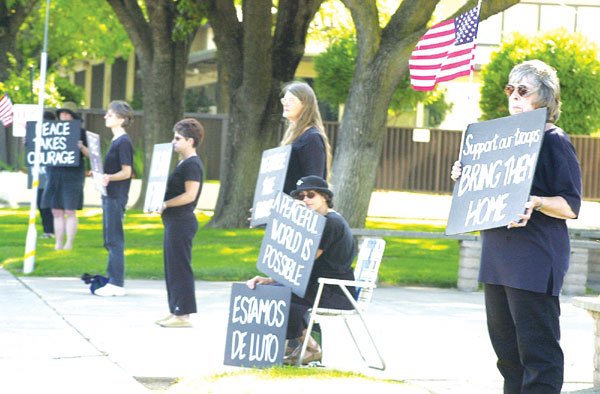Gilroy
– There came a day last week and Cathleen Barrows had had
enough. All around her people were going on about their lives as
though nothing was wrong, as though people, Americans, weren’t
dying every day in a war on the other side of the world, as though
her husband’s life wasn’t in danger. She bega
n confronting strangers about Iraq. As often as not, she said,
they didn’t know what was happening there or how we got
involved.
Gilroy – There came a day last week and Cathleen Barrows had had enough. All around her people were going on about their lives as though nothing was wrong, as though people, Americans, weren’t dying every day in a war on the other side of the world, as though her husband’s life wasn’t in danger. She began confronting strangers about Iraq. As often as not, she said, they didn’t know what was happening there or how we got involved.
“I was just watching people go about their business while my life is just shattered because he’s gone and I don’t know if he’s going to be coming back,” Barrows said. “It got to me. It just didn’t seem fair watching someone go with their boyfriend or girlfriend to Starbucks and my husband’s gone.”
Look around Gilroy and it’s hard to know the country is at war. Aside from the occasional yellow ribbon sticker on the back of a passing vehicle, the city is mostly free of patriotic trappings. There’s even less in the way of anti-war sentiment. However people feel about this country’s presence in Iraq, they’re keeping it to themselves, which was all too clear to U.S. Army Sgt. Jorge Monroy the last time he was home on leave.
“I take no pleasure in replying that I have noticed that not many people really pay any attention to the war,” Monroy said via e-mail from Iraq Thursday. “Maybe its because the war is always the top topic on the news that some people are tired of listening. Now, I’m not saying all of Gilroy feels like this, but I say a fair chunk of the population feels like this.”
It’s been more than two years since President George Bush stood in front of a grand banner proclaiming “Mission Accomplished,” and announced that Baghdad had fallen. But the war has dragged on. Since the invasion in March 2003, 1,718 American soldiers have died there. Gilroy native Jeramy Ailes was killed in action last November. Gilroy resident Bill Jones, a vehement opponent of the war and the Bush administration, said recently that he thinks Ailes’ death made it harder for people in Gilroy to talk about the war.
“There’s a real strong desire for people to share their community and I see that as a really big positive,” he said. “I think, that like a lot of small towns, they are also concerned with hurting each other’s feelings.”
And to Jones, for every liberal afraid to offend a grieving family, there’s a conservative who doesn’t want to admit how poorly the war is going.
“These guys need to not be talking about this,” Jones said.
What little public square debate there is takes place every Friday at First and Monterey streets, where the Women in Black sit in silent protest of the war while across the street, Dottie Stewart and her friend Vicki Ringer, dress in patriotic garb and wave signs.
“I’m diametrically opposed to much of what they stand for. They believe war never solves anything. I would tell them to ask the Auschwitz survivors who were liberated from the death camps by our soldiers,” Stewart said last Friday. “I understand where they’re coming from, but I thought it was time the other side was represented.”
The Women in Black are not protesting troops, and they are not protesting just the war in Iraq. The organization was founded in Israel in 1988 and today women stand in silent vigil all over the world to protest war, ethnic cleansing and human rights abuses. The local group started meeting in front of the Gilroy Library about four years ago and now sits in front of St. Mary Parish.
When the war first began, member Alice Sousa said, drivers would yell obscenities, or stop and hector the women for being unpatriotic.
“In the beginning, people were agitated, people thought we were being unpatriotic,” said Sousa, whose grandson, Joshua Smith, served in Iraq. “People are probably a little more supportive. I think as more dead troops have come home and everything escalates, people are getting a little less supportive [of the war].”
Stewart is a Ronald Reagan conservative who dresses herself – and her car – in patriotic garb and Republican iconography. She doesn’t understand why anyone would choose to not devote themselves to the troops representing the U.S. She thinks that signs of dissent in a time of war encourage America’s enemies and damage soldiers’ morale.
“I believe we have the right to dissent, but there is such a thing as irresponsible dissent,” she said. “There is a time when it is the better part of wisdom not to exercise that right. Our men and women in uniform think that the people back home – that they’re willing to go to war for – think we don’t appreciate them. And that demoralizes them.”
Sgt. Monroy said in his e-mail that he views American protests against the war as protests “against freedom and the U.S.A. I protect you, my wife, freedom and anyone who lives on American soil. So why do these anti-war citizens hate us for it?”
Enrique Barrera, an Army specialist who was in Iraq last year and expects to ship out to Afghanistan in 2006, takes a more measured tone, though he sees support for the war slipping.
“I think that as more things have come out about Iraq, it’s changed people’s opinions,” he said. “It’s true that a lot of what’s happening isn’t seen, but I think people are getting to see both sides of the story.”
Barrera isn’t bothered by protesters. He said he understands that people against the war are not against him personally. He does wish people would adopt a less critical tone of the military’s troubles with prisoners in Iraq and Cuba.
“It’s always easier to criticize than it is to go forth and do something,” he said. “It really doesn’t bother me. Everyone has the right to their opinion. It might not coincide with what I think, but they have the right to do it. They’re not really protesting what the military is doing. They’re just protesting why we’re there.”
Jones said protests against the war are not protests against the troops and complained that many media outlets, including the editorial page in the local paper, make it difficult for people with contrarian views to speak out.
“I think the paper has helped create an atmosphere whereby those people who aren’t rah-rah don’t get a voice because they know they’re going to be attacked,” Jones said. “We’re patriotic, our children are in the field, our flag flies above them as they’re being killed. We want to support them because we’re ashamed about what happened to Vietnam vets.”
The specter of the protests that roiled the country during the Vietnam war still haunts the people who lived through it, whether it’s those who don’t want to see soldiers returning shamed and ruined from a war they don’t believe, or those, like Stewart, who believe it’s a citizen’s duty to inspire the soldiers who protect us.
“The protesters are part of why the tide of opinion turned against our guys and gals [in Vietnam],” Stewart, 52, said. “Some of the same things that happened then, we’re seeing now. Saigon fell and communists killed hundreds of thousands after we left.”
There is one thing Jones, Stewart, the Women in Black, members of the clergy, soldiers and their families have in common – a faith in their convictions that’s rarely tested. When the women on either corner take their signs down each Friday, the public discourse stops. Politically, Gilroyans keep to their own.
“Most of the people I talk to feel the way I do,” Stewart said. “We tend to talk to the people in our circle of influence.”
For Stewart, one of those people is Mark Wilson, senior pastor at the Foothills Foursquare Church, whose son Brooks is serving in South Korea and may soon be shipped to Iraq.
Wilson likes to quote a verse from the book of Romans that says “as far as it depends on you, live at peace with everyone.” But he says the rules for people are different than those for governments. Jesus taught people to turn the other cheek, Wilson said, “but on the national level there is a difference. We can’t just turn the other cheek.
“That’s the goal, that’s the desire of all people, but it’s not peace at all costs. Saddam Hussein was not living at peace and people like that have to be stopped. The reason we have war is that there is evil in this world.”
It’s an evil that some name Saddam Hussein and others call George Bush. It’s an evil that some believe we invite and others think we can’t help but bear as the world’s only great power. It’s an evil that some choose to fight with words and persuasion and others insist we need to meet with force. But on the streets of Gilroy, except for one hour a week on a busy corner, the war isn’t even happening, and Cathleen Barrows feels like she is living in a world only she can see.
“I would like to see people supporting our troops more,” Barrows said. “My husband is my hero, and what is he fighting for? He’s fighting for people who don’t even care that he’s there. Maybe it would make a difference if people knew what was going on. Maybe it would make a difference if people got involved.”













